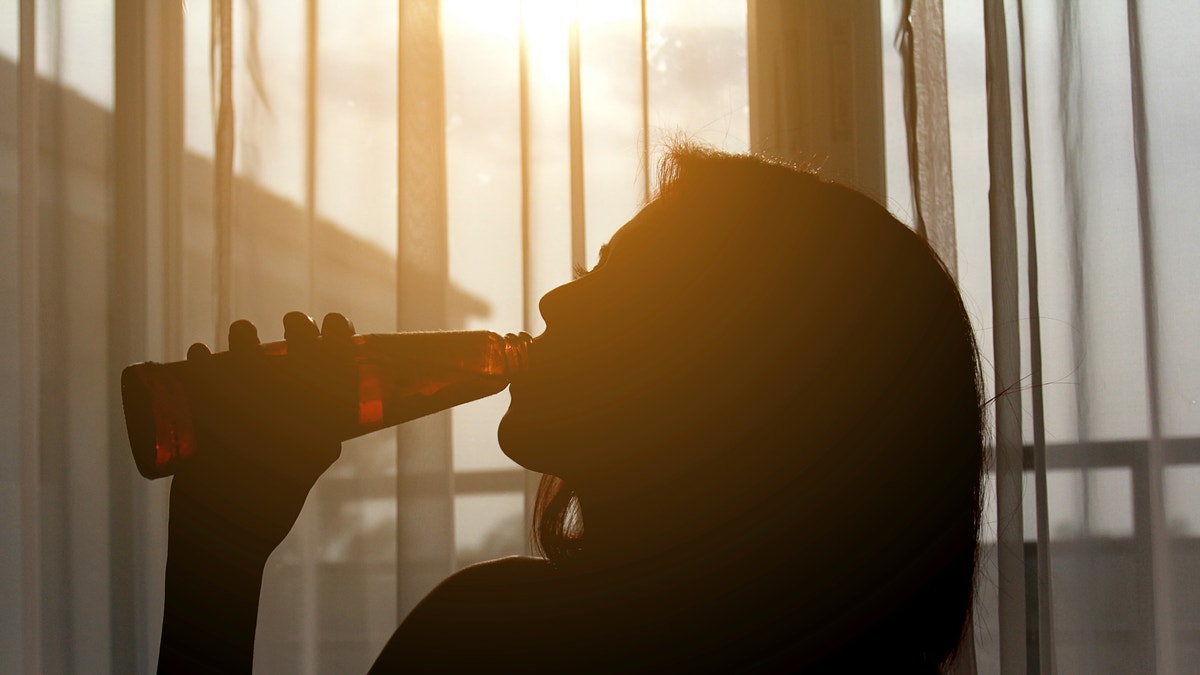
Silhouette shot of a female drinking red wine in a room (kiatipol)
High school girls who have issues with body image and weight are more likely to be drinkers than their peers, a recent U.S. study suggests.
Researchers focused on body image behavioral misperceptions (BIBM) - when girls try to gain or lose weight to change how they look even though there's no medical need for them to alter their weight.
In the study of more than 6,500 teen girls, 38 percent had these misperceptions and roughly two-thirds had tried alcohol at least once.
When teen girls had body image issues that drove them to try to change their weight, they were 29 percent more likely to have tried alcohol and 22 percent more likely to be heavy drinkers than young women without these body image problems, the study found.
"We know that using alcohol as an adolescent is associated with an increased risk for experiencing multiple problems, including school problems, social problems, legal problems, hangovers, illness, risky sexual behavior, disrupted growth and development, physical and sexual assault, alcohol-related motor vehicle accidents, unintentional injury, memory problems, drug misuse, and death," said lead study author Anna Schlissel of the University of Chicago.
"We also know that heavy episodic drinking is associated with even higher risks of health and social problems, and that the younger people start drinking alcohol, the greater their risk for developing substance use disorders later in life," Schlissel added by email.
Drinking can also make body image problems or eating disorders worse, Schlissel said.
To explore the connection between alcohol and body image behavioral misperceptions, researchers examined survey responses collected in 2013 from female high school students, most of whom were 14 to 18 years old.
Overall, 18 percent reported episodes of heavy drinking during the previous month, when they consumed at least five drinks in rapid succession, researchers report in the Journal of Studies on Alcohol and Drugs, online December 12.
Older students were more likely to report alcohol use than teens still in ninth grade, and Hispanic girls were more likely to drink than white girls.
Teens who reported smoking in the past month were also more likely to drink, as were girls who became sexually active before age 13.
Students in twelfth grade and teens with a history of depression or smoking were more likely than younger girls or non-smokers to report heavy drinking.
Among the teens with body image issues, black girls were less likely to have heavy drinking problems than teens in other racial and ethnic groups.
One limitation of the study is that the survey depends on teens to accurately recall their drinking habits and body image issues, the authors note. It's also impossible to tell which started first: the drinking or the body image issues.
The study also doesn't prove that either problem is a cause or effect of the other.
Another shortcoming of the study is that it didn't distinguish between girls trying to lose or gain weight, noted Ken Winters, a psychology researcher at the University of Minnesota who wasn't involved in the study. Girls are unlikely to drink to lose weight, he added by email.
Still, the findings add to evidence linking body image issues with risky behaviors, said Dr. Benjamin Shain, head of child and adolescent psychiatry at NorthShore University HealthSystem in Chicago.
For prevention, it helps for parents to drink responsibly around kids and to teach children about the dangers of drinking before they reach adolescence, Shain, who wasn't involved in the study, said by email.
Parents should also avoid making negative comments about how their daughters look, Shain added. Teens with eating disorders often cite parents' negative comments as a cause, he said.
Vigilance matters, because eating disorders and alcohol abuse can have lasting consequences.
"These include depression, suicide, osteoporosis, infections, joint problems, diabetes, dementia, and cardiovascular disease, to name a few," Shain said. "Behaviors started as an adolescent tend to continue into adulthood."








































